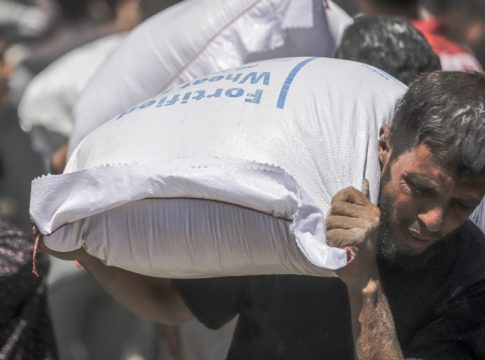The Bitter Dish of Despair: Gaza’s Humanitarian Aid Crisis
In the heart of Gaza, amidst the swirling dust and chaos, the act of acquiring food has transformed into a perilous endeavor—a recipe for desperation. Recent reports unveil a shocking statistic: over 410 people have tragically lost their lives while seeking sustenance from Israeli-controlled aid stations in just the past month. This is a grim reminder of how the simple act of eating can become an act of heroism in a war-torn landscape.
A Taste of Desperation
Imagine standing in a queue, stomach rumbling and heart racing, with hope mingling with fear. As you inch closer to an aid distribution site run by the Gaza Humanitarian Foundation, your thoughts spiral into the unknown. On one hand, the promise of food; on the other, the looming threat of violence. The United Nations has condemned these attacks as “likely war crimes," qualifying this essential search for food as a battle fought under unimaginable conditions.
The Perilous Quest for Essentials
The harrowing stories emerging from Gaza are like tragic dishes that leave a bitter taste in the mouth. Take, for instance, Maher Ahmed’s haunting experience. He entered a distribution center, a place meant to provide comfort, only to witness the senseless death of his friend Mohammed. In a heartbeat, their aspirations for a simple bag of flour were snuffed out, a stark illustration of how fragile life has become in this beleaguered region.
A Controversial Recipe
The Gaza Humanitarian Foundation, a recent player in the aid scene, faces scrutiny for its complex ties to military forces. Critics argue that this privatized approach undermines core humanitarian principles, rendering aid more of a controlled delicacy than an act of compassion. The foundation was birthed with intentions to collaborate closely with Israeli authorities and U.S. military firms, yet its method calls into question the ethics and safety of distributing food in such hostile conditions.
The Flavor of Control
Professor Yaakov Garb’s research highlights the stark realities of these aid compounds, designed more for surveillance than for safety. These facilities, lacking basic amenities and accessibility, are a far cry from what true humanitarian aid should look like. With their claustrophobic layouts and limited exits, they create a "chokepoint" anxiety that hinders rather than helps.
Confronting the Crisis
As the death toll in Gaza soars—estimates exceeding 55,000 according to the Gaza Health Ministry—the call for change rings clear. Experts advocate for a return to genuine humanitarian principles, removing military involvement from food distribution entirely. They point out that true help thrives on neutrality and impartiality, principles that military interventions cannot honor.
Cooking Up Hope
In the tumultuous landscape of Gaza, where each meal tells a story of struggle and survival, the international community must step forward. As food becomes a matter of life and death, activists urge for a return to dignified, independent humanitarian efforts that refuse to compromise on ethics.
In these dark times, every grain, every morsel, becomes a symbol of resilience. As we chew on these sobering realities, let us also savor the power of collective action and compassion. It’s time to revisit our ingredients for peace, ensuring that no one has to choose between starvation and danger again.

Covers wellness, nutrition, mental health, and daily life tips.
Bio: Talia brings a background in health journalism and holistic living to help readers live better, one tip at a time.

